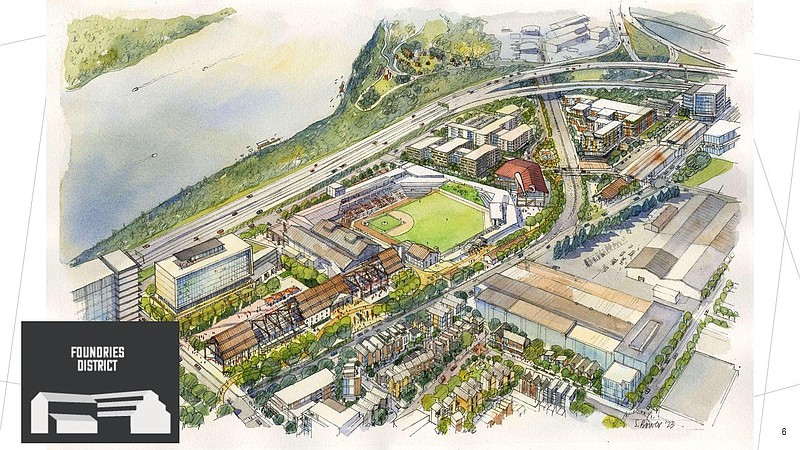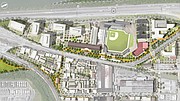Compared to the deal announced three weeks ago, a new funding plan to cover the higher price tag for a new Chattanooga Lookouts stadium could save Hamilton County nearly $25 million, according to Mayor Weston Wamp.
Wamp and Chattanooga Mayor Tim Kelly have been negotiating during the past few weeks on updated terms to cover a price increase for the project. Wamp said Wednesday the stadium deal has been "troubled since Day 1," adding feelings about the project in rural parts of the county range from skepticism to outright opposition.
This new structure reduces the county's share of stadium financing. Under the proposed arrangement, a $26 million loan from the team and landowners would be paid back solely from city property tax revenue generated in a 470-acre district around the stadium — leaving county tax revenue for that loan out of the latest deal.
(READ MORE: Chattanooga Lookouts stadium deal tweaked again)
City property taxes would also cover an additional $5 million borrowed by a joint sports authority for the project. This would be on top of an $80 million bond issue the City Council and the County Commission authorized in August 2022 to fund the construction of the ballfield.
"The county will only be on the hook for the original $80 million scope of the stadium," Wamp told commissioners. "The complicated loan from the private sector that has been much debated will not be repaid with county tax dollars."
An extra $1 million would come from interest on the $80 million, and the Lookouts remain committed to investing $3 million up front for construction.
Funding plan announced Jan. 29:
— $80 million in bonds issued by city-county sports authority, to be paid back mostly by new city and county tax revenue generated by the stadium development.
— $32 million private loan to team and landowner, to be paid back with both city and county property taxes in the district.
— $3 million up front contribution from Lookouts, who would receive up to $250,000 of public funds for 12 years for utilities.
Funding plan announced Tuesday:
— $80 million in bonds issued by city-county sports authority, to be paid back mostly by new city and county tax revenue generated by the stadium development.
— $26 million private loan obtained by team and landowner, paid back with new city property tax revenue in 470-acre tax district, but not with county revenue.
— $5 million in additional sports authority debt, also repaid from city property taxes.
— $3 million up front contribution from Lookouts, who would not receive $250,000 of public funds for 12 years for utilities.
— $1 million interest earnings on $80 million bond.
Overall, the primary funding sources for the stadium are sales taxes collected on purchases in the new facility, a $1 million annual lease paid by the team over 30 years and new property tax revenue realized through the rising value of properties in that 470-acre district.
The Chattanooga Lookouts have been at their home at AT&T Field since 2000, but team officials say they need a new stadium to comply with facility requirements passed down by Major League Baseball. In August 2022 — before Wamp and a new slate of commissioners entered office — city and county leaders OK'd the tax district needed to fund the stadium and created a sports authority to issue up to $80 million in bonds.
(READ MORE: Howard athlete could revive baseball in inner-city Chattanooga)
Under the latest deal, county leaders would in turn invest $15 million into education in the South Broad District. Of that, $10 million would go to The Howard School. Most of that would come from existing bond proceeds, Wamp's office said, and there's a chance a small portion would be pulled from the county's rainy day fund.
The $10 million would be spent no later than one year after the opening of the stadium, and the remaining $5 million, which would support other schools in that area, would be spent within two years of the project's completion.
"We can only revitalize neighborhoods in our community by starting with our schools," Wamp said. "Within this new framework, we make sure Howard benefits from Day 1."
In an interview, Wamp said the county expects to invest in baseball facilities at Howard, which currently lack lights. The school's auditorium is also in some level of disrepair and is underused, he said.
"If the big promises of the developers come to fruition, it would be really cool and appropriate for Howard's auditorium ... to be improved so that it would be a real community asset," he said.
The county is also working with the city to establish firm development commitments around the stadium — projects that would help fuel the growth in property tax revenue needed to pay for the stadium, he said.
"Our desire would be that it would have teeth that would give us legal recourse against the developers if they don't do a portion of what they're saying," Wamp said.
The city intends to reserve future sales tax and property tax revenue from within the district for affordable housing initiatives.
Commissioner Steve Highlander, R-Ooltewah, said he appreciated the diligent work from city and county officials.
"I love baseball," Highlander said at the meeting. "We know that Major League Baseball is tightening up minor leagues. I certainly hope (the Lookouts) can stay here, and I hope we can develop this property. It is concerning to think that my grandchildren will be in their 30s and 40s when this is paid off."
Commission Chair Jeff Eversole, R-Ooltewah, also thanked Wamp for "pulling a chair up to the table."
"That's been my whole goal is let's get to the table, let's present (this) so we can move forward," he said during the meeting.
Especially in unincorporated areas, Eversole said, most Hamilton County residents could care less about a new stadium. They just want county officials to move on.
"I think you guys have worked out a deal," he told Wamp.
Eversole did, however, caution against dipping into the county's rainy day fund for education investments.
"The average citizen out there, $2 million to $3 million is a lot, especially when we've got roads and infrastructure that needs to be fixed," he said. "If we could get 100% of it from bonds and interest, that would be awesome."
Jason Freier, CEO of Lookouts owner Hardball Capital, said in an interview he's happy everybody is on the same page.
(READ MORE: Tennessee Riverwalk to be 'front door' of new Chattanooga Lookouts stadium)
"How the city and county parcel out who's doing what amongst them — as long as both of those bodies are happy with it, far be it from us to have any issues with that," he said. "From the team's standpoint, we still have a deal that we believe is finance-able."
The team has hoped to complete the project in time for the 2025 baseball season, but Freier said Wednesday officials are still figuring out the timeline. If the City Council and County Commission approve this arrangement next week, the project will still have to go through several more votes, including by the sports authority.
"We're still figuring out how quickly we can get through the rest of this process," Freier said. "We can only build a stadium so quickly, so exactly when that could be ready and whether it makes sense to open it in 2025 or not is something we're going to figure out once we figure out the remainder of the schedule."
Contact David Floyd at dfloyd@timesfreepress.com or 423-757-6249.

